SCOFF
Pumpkin Power: Lives devoted to growing them big
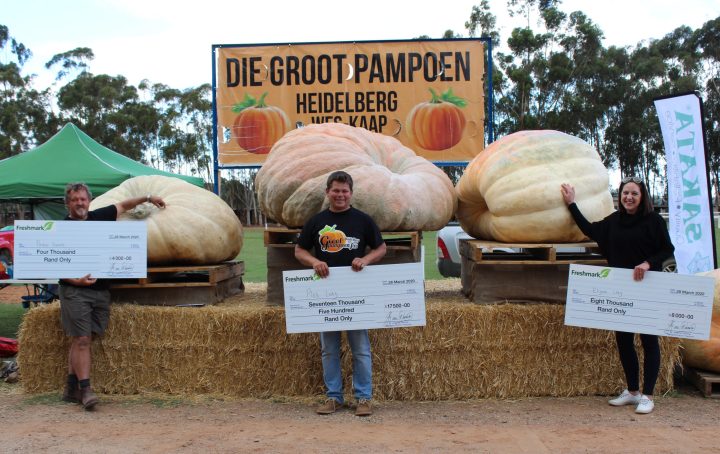
Giant pumpkin growing is a life affirming, escapist activity, but the power of standard-sized pumpkins should not be underestimated.
The author supports Chefs With Compassion, an organisation of hospitality workers who feed hungry people nationwide with meals made using surplus rescued ingredients. Please support them here.
Grow big or grow home, say South Africa’s giant pumpkin people. And they’re not kidding. The current SA record stands at 860kg and many of the pumpkins in their patches are so heavy that a tractor is required to hoist them out of the earth. Saturday, 20 March sees the Transvaal Agricultural Union’s annual TLU SA Goliat van Gat pampoengroeikompetisie. The Western Cape’s Heidelberg Pampoenfees is gearing up for their giant gourd weigh-in on 26 March.
This year the organisers are expecting record numbers of enormous entries. Lockdown resulted in a significant swell of interest in giant pumpkins. A combination of too much time to kill and a desire to control something in the face of an uncontrollable pandemic apparently pushed previously sensible gardeners over the edge of reason. How else would we explain the sudden surge in growing gourds heavy enough to destroy the suspension of a car?
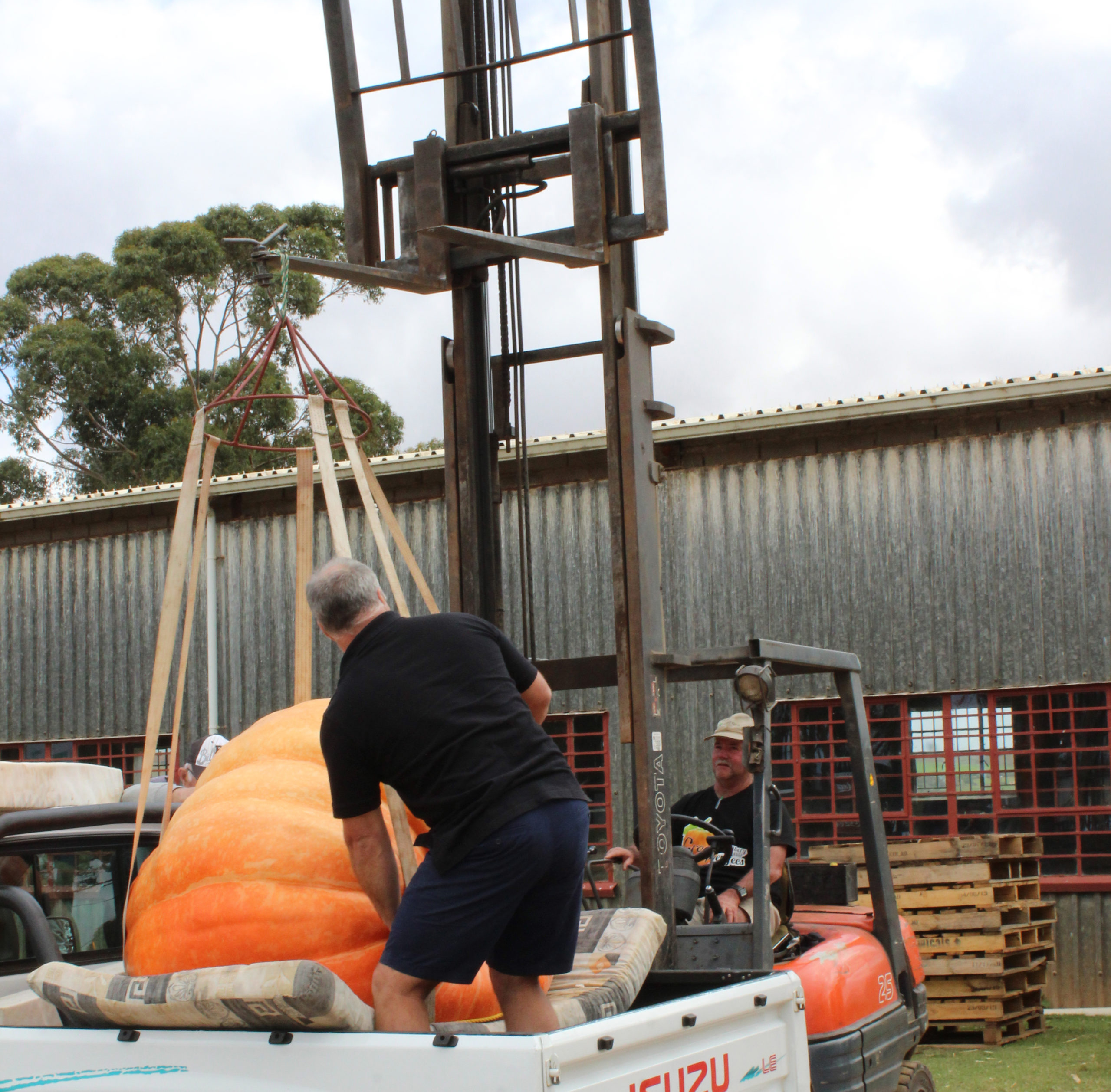
Some pumpkins travel to Heidelberg on mattresses. (Photo: Heidelberg Giant Pumpkin Festival)
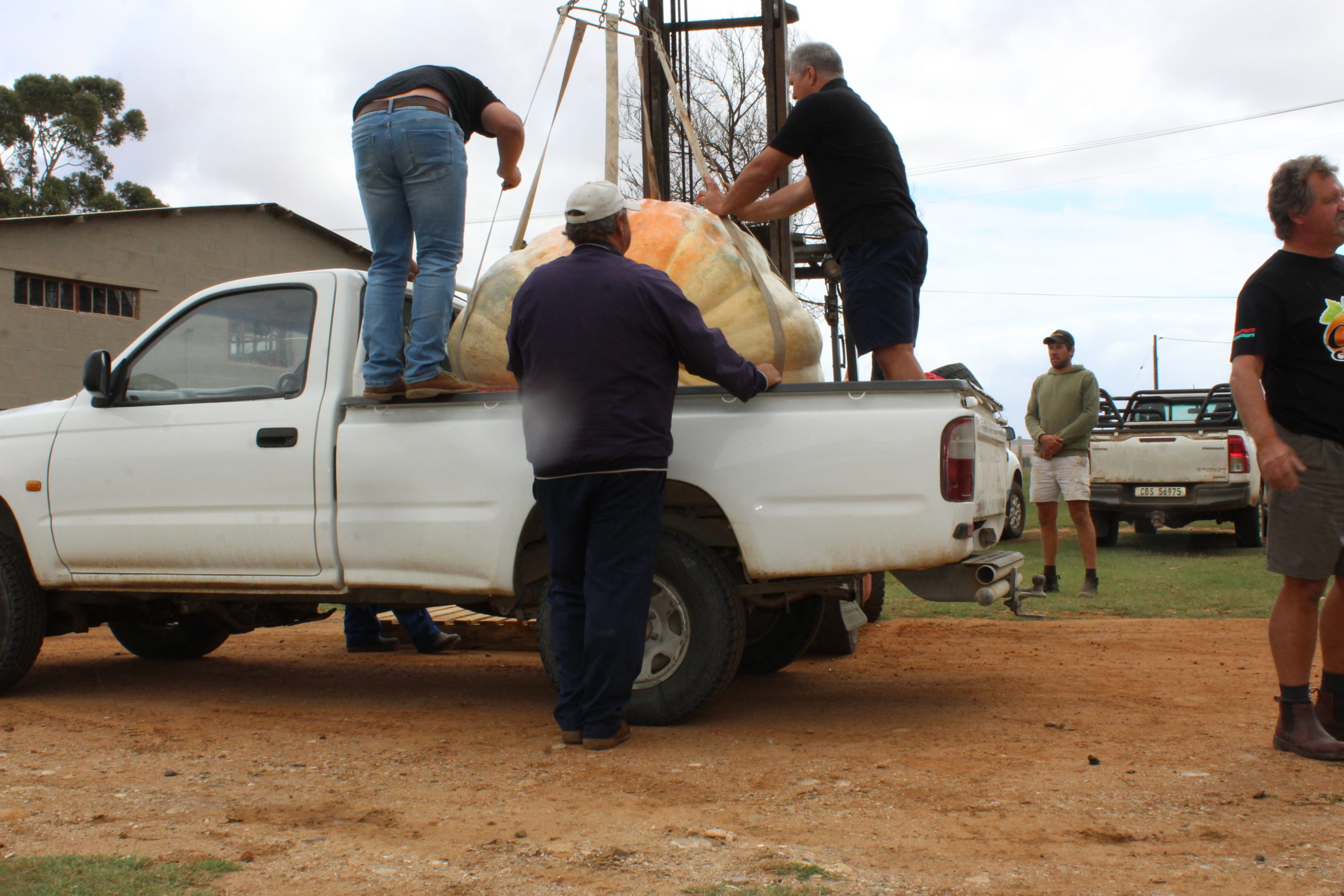
Pumpkin competitors arrive at the 2020 Heidelberg Pumpkin Festival. (Photo: Heidelberg Giant Pumpkin Festival)
Controlling the chaos of Covid is seemingly impossible but nurturing a really big pumpkin can successfully soak up time hanging heavy. These whoppers need an extraordinary amount of attention. Goliat van Gat organiser Henri Combrink observes that: “A lot of guys have given up their lives for these pumpkins. You start in September and it’s a daily effort.”
As pumpkin enthusiast Josiah Brandt explains: “Growing a really huge pumpkin is almost a full-time job. Hours and hours are devoted to its care. Competitive pumpkin growers don’t have other lives. Their lives are their pumpkins.”
Which sounds strange but is not actually that unusual. All sorts of South Africans live their lives along the lines of a pumpkin plant.
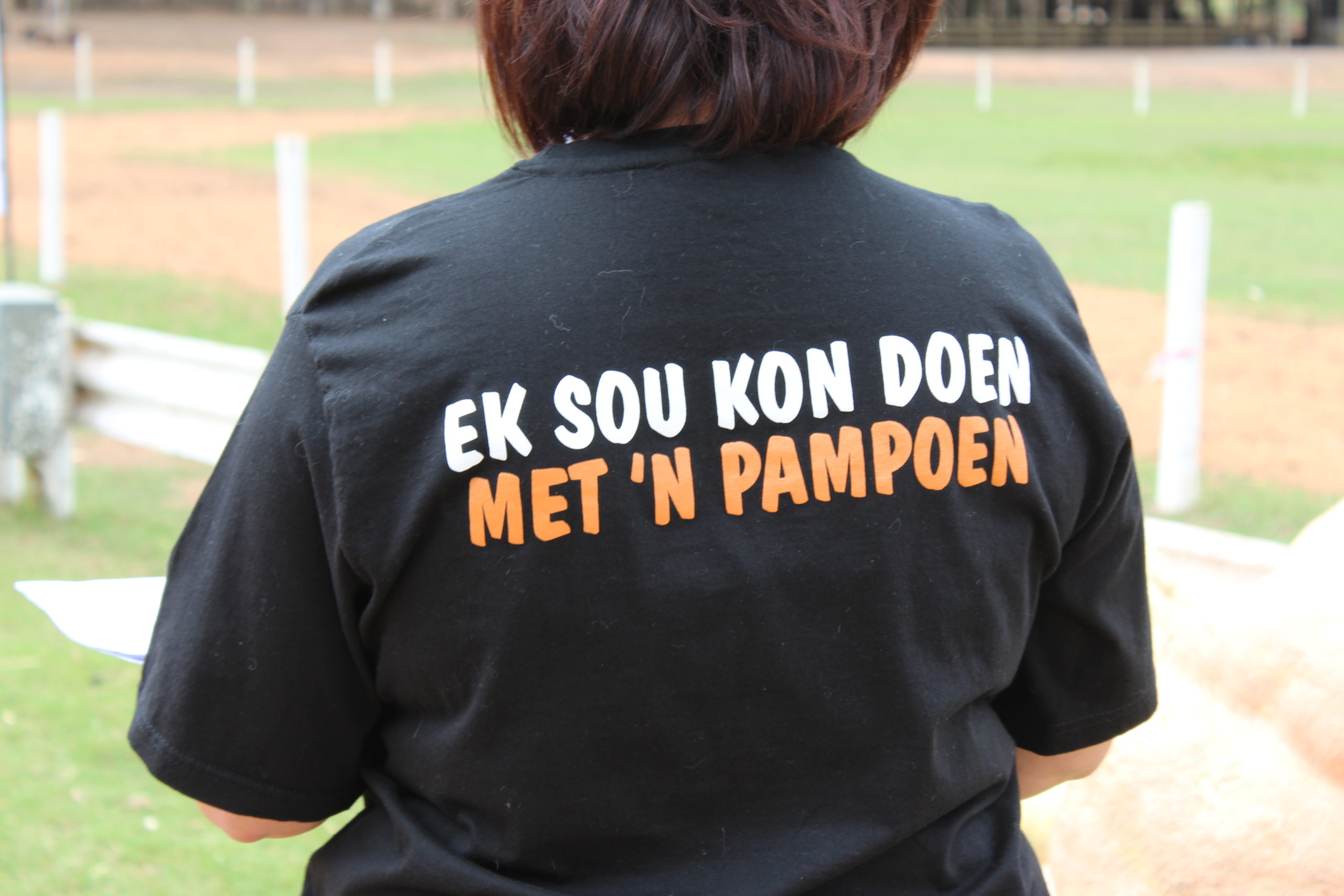
Heidelberg pumpkin festival T-shirts. (Photo: Heidelberg Giant Pumpkin Festival)
Strictly speaking, it is pumpkins and their close cousins – ours is a nation that tends to use the term “pumpkin” quite loosely to refer to the many and varied members of the Cucurbitaceae family which includes various gourds including pumpkins, calabash and melons. The minutiae of when a pumpkin is a melon or a calabash are topics for another day. What matters at the moment is the way in which this family of plants spreads and in so doing offers an abundance of metaphors and similes. Prufrock measured out his life with coffee spoons and Forrest Gump’s mum reckoned it was like a box of chocolates, but an elderly induna in KZN told me that: “Families are joined together like a pumpkin plant. They throw out fruitful shoots and expand because when a young man marries, he moves along from his father’s kraal to a site at some distance but still connected. In time, his sons leave and establish themselves along similar lines.”
In the Eastern Cape, ukuxabangela filler planting is practised, whereby pumpkins, maize and climbing beans are grown together. The maize provides the structure upon which the beans climb, the beans introduce nitrogen into the earth and the pumpkins spread along the ground preventing weeds, protecting roots and retaining moisture in the soil. The isiXhosa verb is also used to describe a mutually supportive way of life between and within families.
All South Africans eat a lot of pumpkin a lot of the time but the ingredient seems to be most prevalent at times of ritualised transition. Recipes and rites of passage often vary between and within groups of people. Many of the ceremonies described below are no longer practised by everyone who identifies as belonging to the group. Even where rituals are still practised they are not necessarily standard. Obviously, individual differences exist everywhere. But, even after all those provisos it is clear that there is a widespread belief in the protective power of pumpkin. There are medical explanations as to why people in stressful situations would do well to eat vitamin, mineral, antioxidant and fibre packed pumpkin but in South Africa the vegetable is not only nutritious but also auspicious.
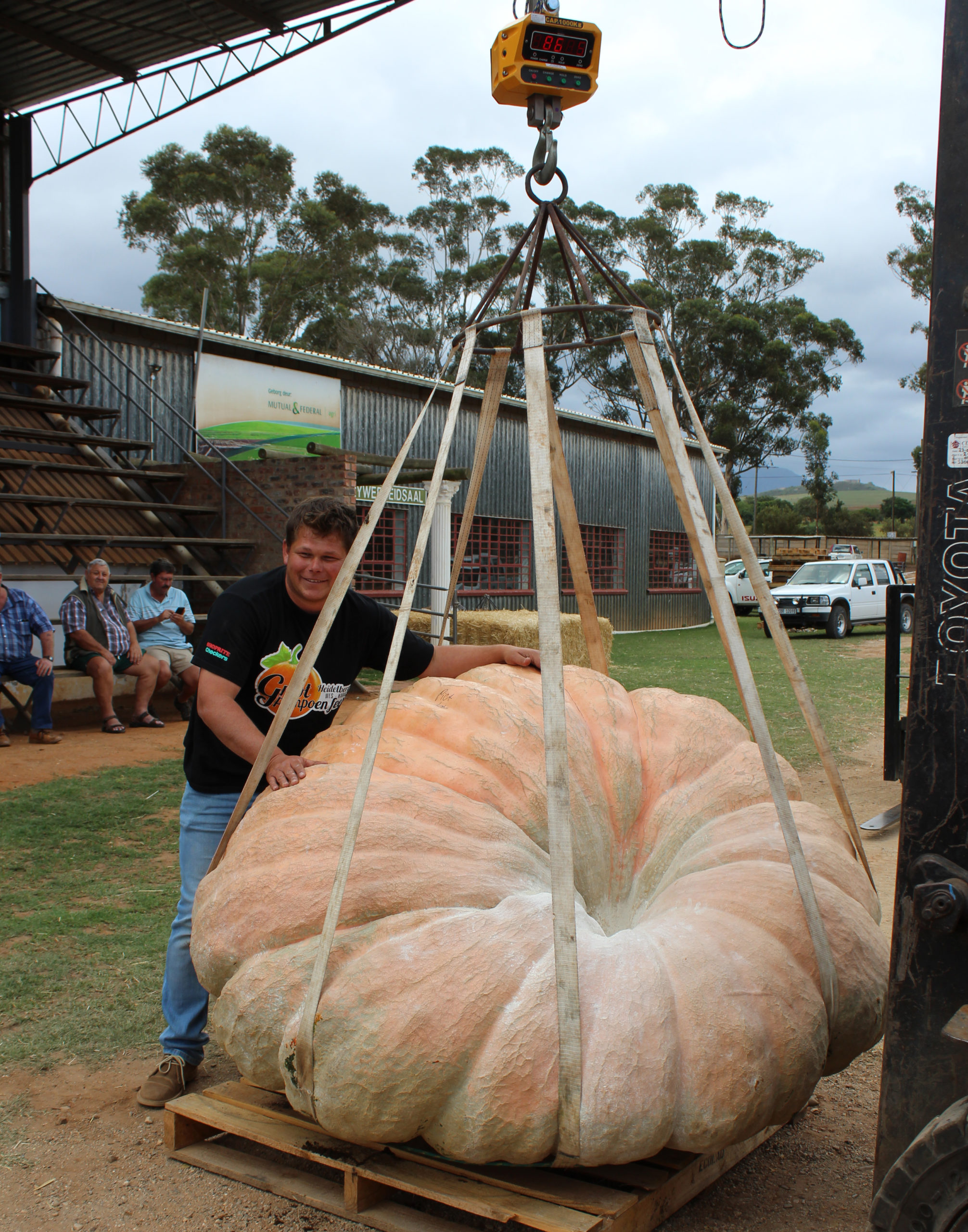
A feeding scheme received winner Piet Lotz’s winning pumpkin. (Photo: Supplied)
Both birth and the early stages of initiation are rites of passage and at certain stages those involved are seen as being in a vulnerable state of ritual uncleanness. Pumpkin is often part of ritualised practices harnessed as a precaution to protect new mothers, babies and initiates from harm. Chef Siya Kobo grew up in Caguba, just outside Port St Johns, where: “New mothers were secluded for the period after giving birth and food made from every part of the ibolose wild melon was brought to them as a cleansing and an aid to recovery.” In Zulu culinary culture new mothers are often served soft, light isijingi (maize meal mixed with pumpkin) or ujeleza (maize meal mixed with ibhece wild melon). Dr Tracy Nelwamondo of Modern Traditions Food speaks of Venda women making infusions from mkhusa pumpkin leaves for healing, pain relief and post-partum cleansing.
All across South Africa initiates undergoing the ritualised transition from child to adult are considered to be similarly vulnerable. Many are subject to food taboos (commonly meat and salt) in the early stages of their rites of passage. Theirs is a symbolic rebirth and the foods involved are similar to those eaten by new mothers. The first phase of Venda initiation often involves a dovhi pumpkin leaf and peanut melange. In the three days immediately after circumcision Ndebele umkhethwa are generally only allowed very soft, salt-free, pumpkin and maize-meal porridge. Tsonga girls (who are traditionally secluded for one to three months after their first menstruation) consume semphemphe made from lerotse melon in the first few days of their isolation.
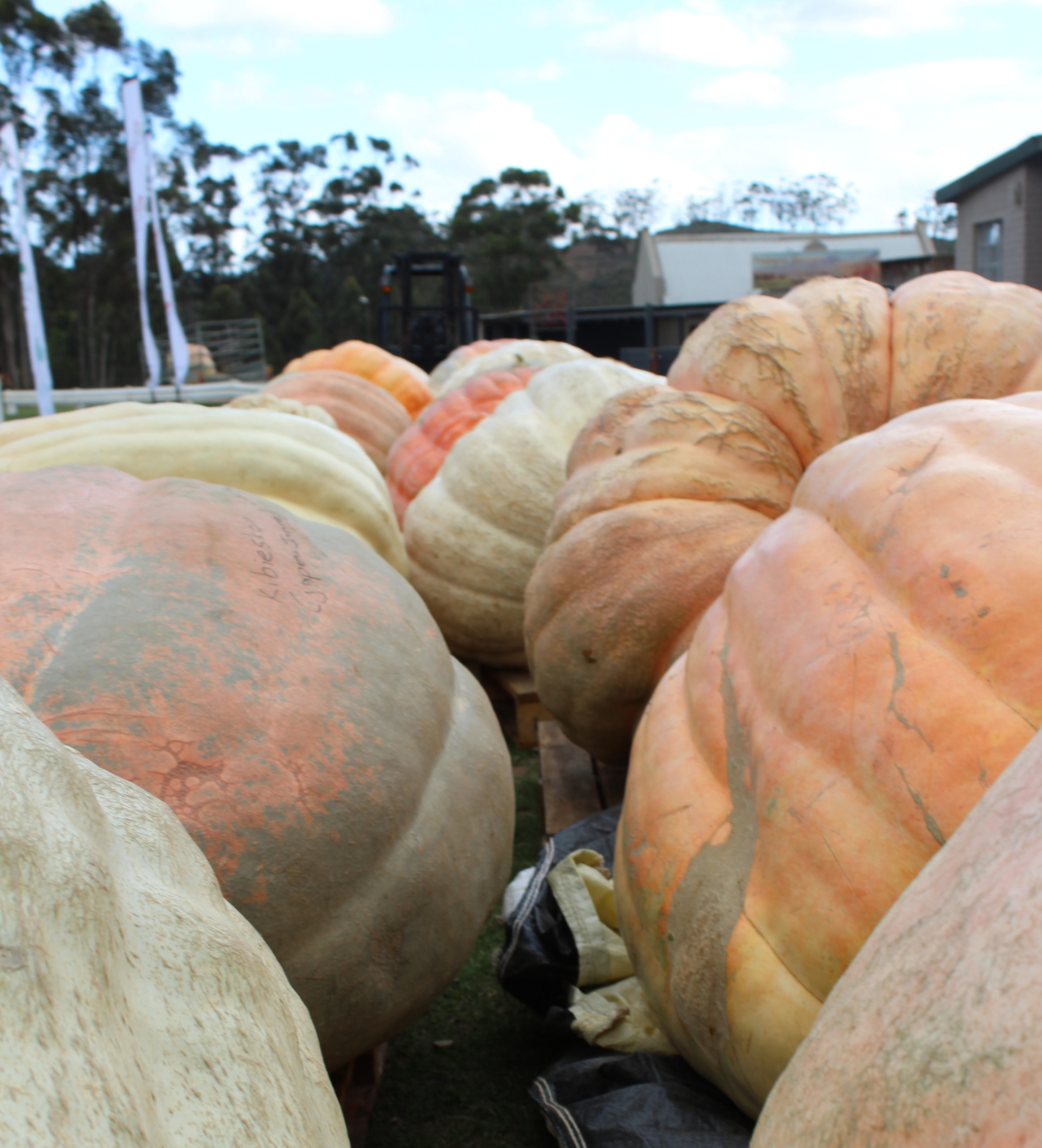
Heidelberg Pumpkin Festival pumpkins waiting to be judged. (Photo: Supplied)
Birth and initiation into adulthood are both major life transitions. While most of us are not in the midst of a biological transition, ours is a society undergoing multiple social, economic, psychological and medical shifts. Is there a way in which South Africans more generally could harness the protective power of pumpkin? We are undeniably vulnerable and in need of ways to affirm our existing support structures and send out new ones. We also need regular inputs of life affirming, stress reducing silliness. Which is where the giant pumpkin competition comes in.
Even in the surreal world of really big vegetables, Covid constraints apply. The TLU SA competition is at the Pretoria Boeremark and thus not legally classified as an event so they are not limited in terms of the numbers of pumpkin fans able to attend. They have, however, had to cancel the previously popular pumpkin seed spitting competition. In Heidelberg only 250 tickets are available for the 2021 food festival. Hopefully, our transition to a post-Covid society will be complete by 2022 and we will all be able to attend. DM/TGIFood
Goliat van Gat pampoengroeikompetisie, Henri Combrink 082 552 9428






 Become an Insider
Become an Insider
Comments - Please login in order to comment.